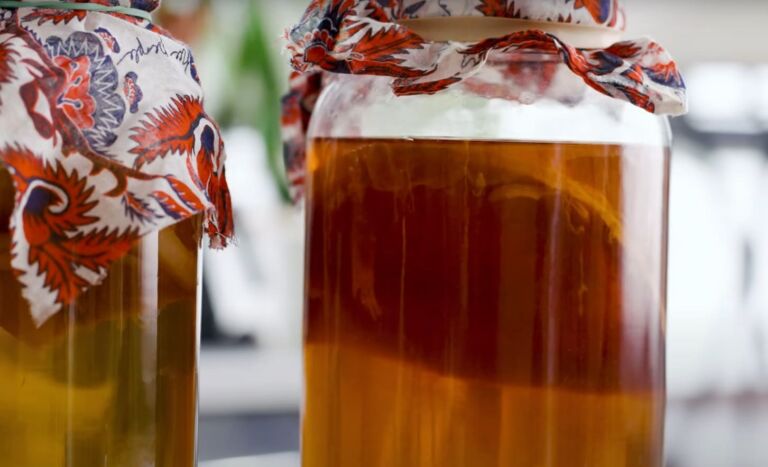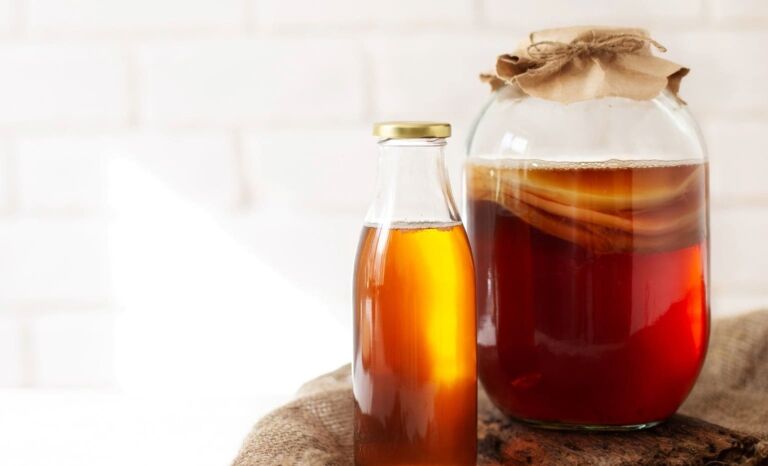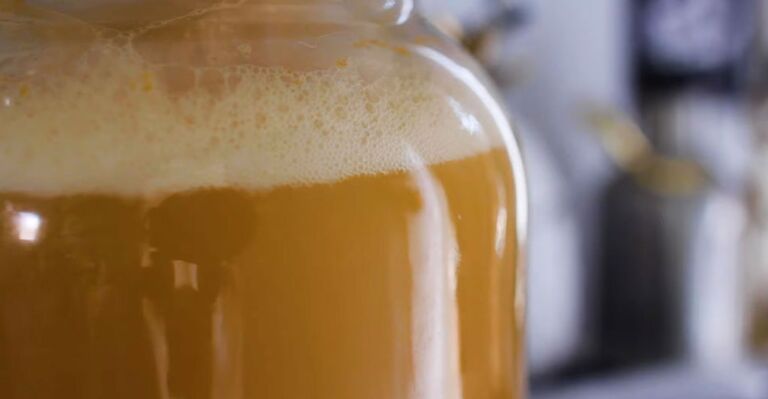How Much Caffeine Is in Kombucha?
Kombucha, the bubbly fermented tea drink, has become popular recently. Its tangy, effervescent taste is undeniably refreshing. But many wonders, with its tea base, does kombucha contain caffeine. And if so, how much? The caffeine content of kombucha depends on a few factors. First is the type of tea used, with black tea containing the most caffeine. Second is the length of fermentation, as the process can degrade some of the caffeine. We’ll explore the caffeine content in popular kombucha brands and types. While kombucha has health benefits, caffeine sensitivity is real. Let’s dive in and determine how much of a buzz kombucha delivers.
Recap in Brief
The caffeine content in kombucha can vary quite a bit. This is because it depends on two main factors:
- The type of tea used to brew the kombucha. Black tea contains more caffeine than green, white, or oolong teas.
- The length of fermentation. Longer fermentation leads to lower caffeine levels as the process breaks down some of the caffeine over time.
On average, an 8oz serving of kombucha made from black tea contains about 15-30mg of caffeine. That’s much less than a cup of regular brewed black tea at around 50mg per 8oz. So, while kombucha does have caffeine, the amount is relatively low compared to tea or coffee. Those sensitive to caffeine may want to opt for a kombucha variety made with green or white tea.

Caffeine Content
Kombucha is a fermented tea drink that has recently gained immense popularity. Since it is brewed from tea, kombucha contains some amount of caffeine. However, the caffeine content can vary substantially depending on the tea type used and fermentation length.
Caffeine Levels by Tea Type
The most significant factor affecting kombucha’s caffeine content is the type of tea used for brewing. Black tea contains the most caffeine out of all tea types. Kombucha made with black tea contains around 15-30mg of caffeine per 8oz serving. Green tea has approximately half the caffeine of black tea. So green tea kombucha has about 15mg of caffeine per 8oz. White and oolong teas are the lowest in caffeine, so kombucha from these varieties contains very little caffeine.
Caffeine Reduction During Fermentation
There is some evidence that the fermentation process reduces the original caffeine from the tea leaves, but the exact percentage is unclear. One study found caffeine decreased by about 25% after two weeks of brewing. However, more research is needed on the effects of fermentation time on caffeine levels. Proper fermentation is essential for caffeine content and kombucha’s flavor.
Comparing Kombucha to Tea and Coffee
While kombucha made from black tea has the most caffeine, its levels are still much lower than brewed black tea or coffee. On average, 8oz of kombucha only has about 15-30mg of caffeine compared to 50mg in black tea and 95mg in coffee. So, kombucha is a relatively minimal source of caffeine.
Brand Variations
Popular kombucha brands can vary in caffeine content based on the tea ingredients and fermentation process. To estimate caffeine levels in a particular brand or variety, check which teas are used in brewing. Some brands offer decaffeinated kombucha options as well.
The Bottom Line
Kombucha does contain caffeine since it is brewed from tea, but the amounts are low compared to traditional tea or coffee. Consumers can choose decaf kombucha to avoid caffeine altogether. But for most people, kombucha’s low caffeine content is not a concern.

Enjoying Kombucha
Kombucha is a probiotic-rich fermented tea drink that has recently surged in popularity. However, some wonder if its naturally present caffeine can cause problems for specific groups or when consumed in the evening. We’ll explore kombucha’s caffeine content, who should exercise caution, and tips for safely enjoying its benefits anytime.
Kombucha’s Low Caffeine Levels
Kombucha is brewed from tea, so it contains caffeine, but in low amounts. An 8oz serving averages 15-30mg of caffeine. This minimal caffeine comes from the tea used, mainly black but sometimes green. The fermentation process actually degrades some of the original caffeine from the tea leaves. Compared to the 95mg caffeine in coffee or 50mg in brewed black tea, kombucha is not a significant source of caffeine. However, it provides more stimulation than decaf coffee or herbal caffeine-free teas.
Caffeine Sensitivity
Due to kombucha’s low caffeine levels, it’s generally safe for those sensitive to caffeine when consumed in moderation. Most people don’t experience adverse side effects from kombucha’s minimal caffeine hit. However, some with extreme sensitivity may choose decaf kombucha varieties just to be extra careful. Also, pregnant women are advised to limit overall caffeine intake to less than 200mg per day from all sources. So those pregnant may want to enjoy decaf kombucha occasionally in place of regular booch.
Kombucha for Children
There is insufficient research to establish the safety profile of kombucha for children. Therefore, health authorities caution against giving kombucha to kids under age 18. The potential risks for children are unknown. Parents should err on the side of caution and avoid giving kombucha to their kids due to its caffeine content and preservation in acid. Kids are susceptible to caffeine, which can impair sleep and focus.
Enjoying Kombucha in the Evening
For most adults, enjoying kombucha in the evening is unlikely to cause sleep disturbances. Given its low caffeine content, having a bottle with dinner or later at night is generally not an issue. However, those highly sensitive to caffeine may want to stick to decaf kombucha at night just to be extra safe. Limiting intake to 8-12oz is also wise in the evening. Pregnant and breastfeeding mothers should cease caffeine consumption entirely at least six hours before bedtime, so evening kombucha should be avoided.
Sticking to Moderate Consumption
To safely enjoy kombucha any time of day, moderating intake is critical. Consuming no more than 16oz spread throughout the day is a reasonable limit. Excessive intake may cause temporary gut discomfort in some due to kombucha’s acids and carbonation, though not from its caffeine. For reference, healthy adults can safely consume up to 400mg of caffeine per day. With kombucha containing just 15-30mg per serving, adverse effects are implausible when sticking to moderate, spread-out consumption.
Avoiding Caffeine Overload
Consider your other caffeinated intake to prevent going overboard on total caffeine from all sources when drinking kombucha. If you consume coffee, tea, soda, or energy drinks containing caffeine, be sure to track your daily dose. Subtract the caffeine from your kombucha servings from the recommended 400mg upper limit. This allows you to balance kombucha with other caffeine sources.
Kombucha for Hydration
The water content also helps offset the mild caffeine stimulation in kombucha. Enjoying kombucha in place of diuretic caffeinated beverages like coffee allows for better hydration. The electrolytes and potassium in kombucha support hydration and recovery, unlike the dehydrating effects of excessive caffeine. Drink kombucha with meals or between meals to meet your daily fluid intake goals.
Benefits Beyond Caffeine
Remember that kombucha’s actual benefits come from the probiotics, antioxidants, and cleansing acids produced during fermentation, not its minimal caffeine. The organic acids support detoxification. The probiotics aid digestion and immunity. And the antioxidants fight cell damage. So don’t just focus on its caffeine when considering kombucha’s advantages. The complete biochemical profile offers excellent wellness benefits.

The Bottom Line
Kombucha naturally contains some caffeine, but the amounts are lower than coffee, tea, or energy drinks. When enjoyed in moderation, kombucha is unlikely to cause problems due to its caffeine content for most healthy adults. Those highly sensitive may opt for decaf. But anyone can safely enjoy kombucha anytime by sticking to recommended consumption limits, properly hydrating, and leveraging its complete nutritional profile.
Alcohol Content
Kombucha is a fermented tea that has gained immense popularity for its tangy flavor and probiotic content. However, some questions arise about alcohol being produced during the fermentation process. We’ll take a look at the alcohol content in kombucha and the factors that affect it.
Typical Alcohol Range
The fermentation of kombucha involves yeast and bacteria that produce alcohol as a byproduct. However, most commercial kombucha contains less than 0.5% alcohol and is classified as a non-alcoholic beverage. Some testing has shown alcohol levels between 0.5-1.0%, still a minimal amount. Homebrewed kombucha falls in the same range when fermented correctly for just 7-10 days.
Over-Fermentation Increases Alcohol
If kombucha is allowed to ferment for too long, like 30 days or more, the alcohol content increases above the FDA’s 0.5% limit for non-alcoholic labeling. Some homebrewers exploit extended fermentation to produce a boozy “kombucha beer.” However, over-fermenting negatively impacts the flavor. The best practice is to limit fermentation to 14-21 days to prevent very high alcohol levels.
Second Ferment Boosts Carbonation
A brief second ferment to boost carbonation usually does not raise alcohol amounts significantly. The yeasts and bacteria consume most of the remaining sugars, producing CO2 rather than alcohol. A 2-3 day second ferment is considered safe in terms of alcohol content. Longer second ferments could increase alcohol.
Checking Alcohol Content
Consumers who want to verify the alcohol content in their kombucha can use testing strips or meters. These check for alcohol levels between 0.5-3% range. Testing each new batch is ideal for those concerned about excess alcohol production. Keep in mind that alcohol content can continue to rise slowly during storage as fermentation processes continue.

FAQ
Does the brand of kombucha impact caffeine levels?
Yes, kombucha brands that use different tea sources and fermentation methods can affect the caffeine content. Some popular brands like GT’s Original Kombucha use a blend of black and green teas, resulting in around 20-25mg caffeine per 8oz bottle. Their Enlightened line only uses green tea, so it has more than 15mg per bottle. Health-Ade Kombucha sources organic black tea for around 30mg per 8oz serving. Their Calm variety uses juniper berry tea and contains 10mg of caffeine. Brew Dr. Kombucha gets its caffeine from black tea and has about 15-25mg per 8oz. So check the ingredients list to see which teas are used in your favorite kombucha brand to estimate caffeine levels.
How does the caffeine in kombucha compare to coffee?
The caffeine content in kombucha is much lower than coffee. An average 8oz cup of kombucha only has about 15-30mg of caffeine. Compare that to the 95-200mg caffeine found in a typical 8oz cup of brewed coffee. An espresso is even higher, with around 77mg of caffeine per 1oz shot. The fermentation process in kombucha reduces the original caffeine from the tea leaves. So, while kombucha does contain some caffeine, it’s a minimal amount compared to a cup of joe. Those sensitive to caffeine may be able to enjoy kombucha in moderation but still need to limit coffee intake.
Is caffeine the reason for kombucha’s health benefits?
No, the caffeine content in kombucha is not responsible for its health benefits. The primary health-boosting components in kombucha are the probiotics, antioxidants, and acids produced during fermentation. The live cultures of bacteria and yeasts act as probiotics that support digestive and immune health. Antioxidants are present in the tea itself. Fermenting kombucha also generates beneficial acids like glucuronic, gluconic, and lactic acid. The vitamin content depends on the original tea ingredients. Compared to these other active components in kombucha, the caffeine content is relatively low and not the driver of its health effects. The benefits come from the fermentation, not the caffeine.
Is decaf kombucha available?
Yes, you can purchase or make your own decaf kombucha. To produce decaffeinated kombucha, look for unique decaffeinated tea bags made from green, black, white, or oolong tea. The tea leaves are washed in a solvent like ethyl acetate or carbon dioxide to remove almost all of the caffeine, usually about 97-99%. The finished kombucha will be caffeine-free when using these decaf tea bags to brew the sweet tea base. Some brands selling decaf kombucha include Humm Kombucha’s Decaf Black Cherry flavor, which uses decaffeinated black tea. Teahouse Tea has a Decaf Kombucha line using decaf green and black teas. You can also find decaffeinated kombucha at health food stores or make your caffeine-free booch at home.
Final Words
Ultimately, kombucha contains caffeine, but the amount can vary widely. Factors like the tea source and fermentation time impact caffeine levels. While kombucha made from black tea packs the biggest caffeine punch, even then, a serving may only have 15-30mg. That’s far less than traditional brewed black tea. For caffeine-sensitive people who want to limit intake, kombucha made from white or green tea is the best bet. With more knowledge of the caffeine content in different kombucha varieties, consumers can make informed choices. Yet, no matter the tea source, kombucha offers a refreshing, lightly caffeinated alternative to sugary carbonated beverages. Though its caffeine content is low, kombucha provides probiotics and antioxidants for your health.







